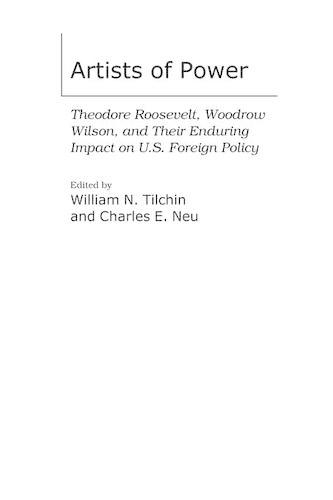
Artists of Power: Theodore Roosevelt, Woodrow Wilson, and Their Enduring Impact on U.S. Foreign Policy
(Hardback)
Publishing Details
Artists of Power: Theodore Roosevelt, Woodrow Wilson, and Their Enduring Impact on U.S. Foreign Policy
By (Author) William N. Tilchin
Edited by Charles Neu
Bloomsbury Publishing PLC
Praeger Publishers Inc
30th November 2005
United States
Classifications
Professional and Scholarly
Non Fiction
International relations
History of the Americas
327.73
Physical Properties
Hardback
224
Description
Theodore Roosevelt and Woodrow Wilson were remarkable statesmen, early twentieth century artists of power whose diplomacy has had an enduring impact on U.S. foreign policy. These two leaders were creative, farsighted diplomatists who confronted serious international challenges during their presidencies, and who conceived and implemented policies designed both to resolve immediate problems and to set the United States on the best possible course for the future. Crafted by prominent historians, the eight chapters of this volume implicitly and explicitly urge students of history to recognize that both Theodore Roosevelt and Woodrow Wilson were intelligent, insightful, forward-looking statesmen, and that since World War II the influence of their ideas and approaches on U.S. diplomacy has been ongoing and significant. Chapters 1 through 3 cover Theodore Roosevelt's strategic thinking, personal diplomatic style, and his relationship with Britain. Chapters 4 through 6 examine Woodrow Wilson's interaction with his senior foreign policy advisors, and analyze his decision-making leading up to the U.S.'s entry into World War I. Two concluding chapters, 7 and 8, show how the two men made the United States both a world power and the architect of twentieth century world order. With an introduction by Charles E. Neu and Afterword by William Tilchin.
Reviews
The virtue of this collection is tha it provides a convienent source in which to find concise statements of some commonly held historiographical positions. * The Journal of American History *
Author Bio
William N. Tilchin earned a PhD at Brown University, where co-editor Charles E. Neu was his thesis director, in 1992. Since 1994 Dr. Tilchin has been teaching U.S. diplomatic history and other subjects in the College of General Studies at Boston University. He is the author of Theodore Roosevelt and the British Empire: A Study in Presidential Statecraft (1997) and many essays on Roosevelt's foreign policy and related topics. Charles E. Neu is Professor of History, Emeritus, Brown University, and Adjunct Professor of History, University of Miami. He is the author of many articles, chapters, encyclopedia entries, and reviews, and has written, co-edited, or edited the following: An Uncertain Friendship: Theodore Roosevelt and Japan, 1906-1909 (1967), The Troubled Encounter: The United States and Japan (1975), The Wilson Era: Essays in Honor of Arthur S. Link (1991), After Vietnam: Legacies of a Lost War (2000), and America's Lost War: Vietnam, 1945-1975 (2005).
